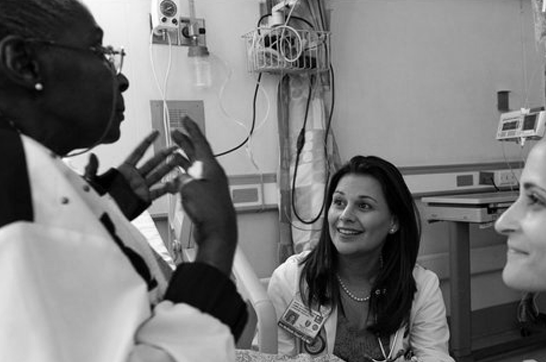Traumatic Brain Injury
Know More: Traumatic Brain Injury
Trustworthy information, straight from the source. Education is the first step in an empowering healthcare plan. Learn more about traumatic brain injury, from prevention to diagnosis and treatment.

Condition Overview
What is traumatic brain injury?
Brain dysfunction or other brain pathology resulting from an external force.
Dementia
Acquired multiple cognitive defects that include memory impairment in combination with aphasia, apraxia, agnosia or a disturbance of executive function that are severe enough to cause impairment in occupational or social functioning and that represent a decline from previous baseline functioning.
Diagnosis & Treatment Options
TBI
The diagnosis of traumatic brain injury (TBI) is based on a history of external force being applied to the head with subsequent changes in brain function such as loss of consciousness (LOC), posttraumatic amnesia, mental status changes, or clinical findings of neurologic deficits. Initial assessment of severity is determined by the Glasgow Coma Scale (GCS) score, and further evaluation based on the GCS score, the mechanisms of injury, and other risk factors.
Neuroimaging is necessary in moderate and severe TBI to assess the structural damage and need for surgical intervention; in such cases, cranial CT scanning is the test of choice. A cranial CT scan is recommended for all adults with penetrating head injury or a GCS of 14 or less presenting with a closed head injury. It is also suggested in adults with mild traumatic brain injury if certain risk factors are present.
Cranial CT scanning is recommended for all pediatric patients with moderate to severe head injuries. Cranial CT is not recommended for the initial evaluation and management of children older than 2 years of age.
Dementia
In patients with suspected dementia, neuropsychological testing may be helpful to diagnosis dementia in patients with subtle or atypical findings and to distinguish between the different types of dementias. Neuropsychological testing can also determine the extent of the cognitive impairment and establish a baseline.
Although standardized mental status tests and more comprehensive instruments for evaluating cognition are reasonably accurate for diagnosing early dementia before functional impairment is severe, no single screening test is appropriate for all patients being evaluated for possible cognitive impairment. The choice of initial test should be population appropriate, with consideration of the individual patient’s age, race, and educational level. The Mini-mental State Examination is the most practical tool for detecting cognitive impairment of at least moderate severity. Brief screening instruments such as the memory impairment screen and the Clock Drawing Test are rapid but less sensitive tests. Other screening instruments can be added as needed for more comprehensive testing or special situations.
Treatment of dementia and Alzheimer disease requires a multidisciplinary and multimodal approach that varies depending on the stage of illness and specific symptoms. Adequate education of all caregivers, attention to safety concerns, selection of appropriate environment of care, development and maintenance of daily activity structure, and general health maintenance are important considerations. Care should be taken so that patient dignity is preserved, patient limitations are minimized, and patient capabilities are maximized. Attention to the needs of the caregivers will assist in assuring these goals.
Both nonpharmacologic and pharmacologic interventions can be used. Cognitive symptoms, neuropsychiatric symptoms such as psychosis, agitation or other behavioral problems, and depression are the major areas at which treatment is directed. In addition to patient improvement in cognition, behavior, and functional activities, relief of caregiver burden is another focus of treatment.
Nonpharmacologic management should be employed first. Possible contributing causes such as medical illness, unmet physical or psychological needs, environmental conditions, or unsophisticated caregiving should be corrected. Psychosocial treatments include various cognition-, behavior-, emotion-, and stimulation-oriented approaches that may have some effect in restoring cognitive deficits, improving mood and socialization, reducing specific behavioral problems such as urinary incontinence and disruptive or aggressive conduct, and improving quality of life.
Preparing for Care
 The Clinical Neuropsychological team works with primary physicians at multiple North Memorial Health clinics as well as North – Robbinsdale Hospital and North – Maple Grove Hospital to help evaluate individuals with suspected or demonstrated neurological problems. These evidence-based assessments can assist in differentially diagnosing potential reasons for cognitive decline such as reversible causes of depression versus the early stages of a progressive dementia.
The Clinical Neuropsychological team works with primary physicians at multiple North Memorial Health clinics as well as North – Robbinsdale Hospital and North – Maple Grove Hospital to help evaluate individuals with suspected or demonstrated neurological problems. These evidence-based assessments can assist in differentially diagnosing potential reasons for cognitive decline such as reversible causes of depression versus the early stages of a progressive dementia.
Outpatient evaluations are provided for adults (18 years of age or older) for a wide range of cognitive concerns, including those related to potential traumatic brain injury, progressive dementing disorders, substance-abuse, and stroke among others. Results and recommendations from neuropsychological evaluation are available to the referring provider and patient for intervention planning.
Inpatient Services
Neuropsychological assessment is also available for inpatient consultation on the medical and psychiatric units at North – Robbinsdale Hospital. This inpatient service often includes brief cognitive screens to assist in making recommendations for discharge or assistance in determination of decision-making capacity.
Click here for information on the North Memorial Health Mental Health & Addiction Center or call (763) 581-5372.
